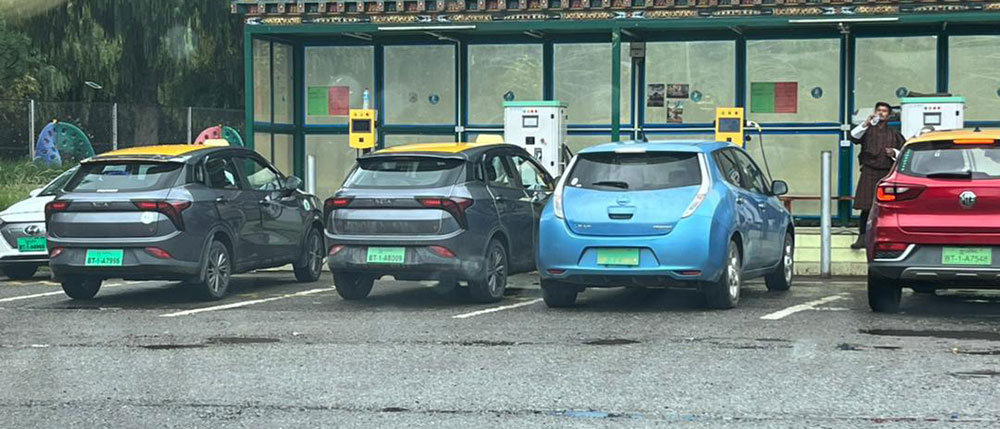Only about 0.3 percent (424) of total registered vehicles are EVs today
Yangyel Lhaden
The country could see more electric vehicles (EVs) and electric buses as talks were underway with the Global Environment Facility and Green Climate Fund to expand electric vehicle projects in the country, with investment through the Government of India’s project-tied assistance.
The Prime Minister Tshering Tobgay shared this during last week at the meet-the-press session. It will, however, be a challenge as currently, EV makes only about 0.3 percent (424) of total registered vehicles in the country. There are 126,501 total registered vehicles as of 2023 according to Bhutan Construction and Transport Authority.
The pilot project called the “Bhutan Sustainable Low Emission Urban Transport System,” which started in 2019 has successfully replaced 300 fuel driven taxis in the country.
The Prime Minister said that it seemed that after the project there was not much progress in the country for EV, but the reality is because of moratorium on the import of non-essential vehicles imposed by the government. “The government will provide extra support to people opting to buy EV similar to the supports provided by the EV project, in addition to tax concessions on EV.”
The EV project provided a 20 percent subsidy on the cost of the EV with a maximum ceiling of USD 5,500 and a 70 percent loan facility from the financial institution. A taxi driver, who availed the subsidy, had to pay only 10 percent of the cost upfront.
The price of EV cars ranges from Nu 1.5 million (M) to up to Nu 3M depending on the brand.
A taxi driver who bought an EV worth about Nu 2.3M received a subsidy of about Nu 400,000 (20 percent), paid about Nu 300,000 upfront, and availed about Nu 1.6M loan from the bank. He pays about Nu 25,000 monthly to the bank.
He said that for taxi drivers, paying Nu 25,000 to the bank was equivalent to fueling his taxi monthly. “I expect returns when I complete paying the loan, but the same mechanism would be expensive for private individuals.”
The electric vehicle initiative is one of the components of the Low Emission Development Strategy (LEDS) for Surface Transport (2021-2050) policy, a 30-year strategy prioritising climate actions for reducing greenhouse gas emissions.
While the country’s main source of energy is from renewables, its energy consumption for the transportation sector is largely from fossil fuels and Bhutan pledged to remain carbon neutral for all times to come during the 15th Conference of Parties (COP15) in 2009.
Meanwhile, Bhutan imported around 144,339.85 kiloliters (KL) of oil in 2022. By and large, most oil imports are supplied as fuel for automobiles. The total supply of petrol increased from 32,819.5 kiloliters (KL) in 2021 to 36,696.73 KL in 2022, while the supply of diesel decreased from 290,636 KL in 2021 to 110,349.5 KL in 2022, according to the Environmental Accounts Report, 2023.
Import of fuel is a key import commodity in the country and according to trade statistics, fuel import surged from Nu 11.37 billion in 2022 to Nu 13.35 billion in the past year, indicating a significant uptick. This contrasts sharply with previous years, where imports stood at Nu 10.26 billion in 2019.
A liter of petrol releases about 2.3 kilograms (kg) of carbon dioxide. In 2022, if all petrol was combusted, it would have produced about 250,000 KL of carbon dioxide. A liter of diesel produces about 2.7 kg of carbon dioxide. If all diesel imported in 2022 was combusted, it would have produced 290,636 KL of carbon dioxide.
The Prime Minister said that the EV project, which started during his second term, was a unique initiative aimed at promoting sustainable transport. “Under this project, five parties were involved: drivers contributed funds, the government provided subsidies, EVs were exempt from taxes, charging stations were offered for free, and EV manufacturers reduced costs.”
Henceforth, the success of the pilot project would be expanded, and many more initiatives to promote EVs would follow, the Prime Minister added.


